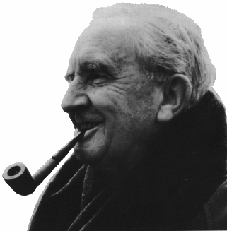


 olkien was a scholar by profession. His academic positions were: staff member
of the New English Dictionary (1918-20); Reader, later Professor of English Language at
Leeds, 1920-25; Rawlinson and Bosworth Professor of Anglo-Saxon at Oxford (1925-45); and
Merton Professor of English Language and Literature (1945-59). His principal professional
focus was the study of Anglo-Saxon (Old English) and its relation to linguistically
similar languages (Old Norse, Old German, and Gothic), with special emphasis on the
dialects of Mercia, that part of England in which he grew up and lived, but he was also
interested in Middle English, especially the dialect used in the "Ancrene Wisse"
(a twelfth century manuscript probably composed in western England). Moreover, Tolkien was
an expert in the surviving literature written in these languages. Indeed, his unusual
ability to simultaneously read the texts as linguistic sources and as literature gave him
perspective into both aspects; this was once described as "his unique insight at once
into the language of poetry and the poetry of language" (from the Obituary; Scholar,
p. 13).
olkien was a scholar by profession. His academic positions were: staff member
of the New English Dictionary (1918-20); Reader, later Professor of English Language at
Leeds, 1920-25; Rawlinson and Bosworth Professor of Anglo-Saxon at Oxford (1925-45); and
Merton Professor of English Language and Literature (1945-59). His principal professional
focus was the study of Anglo-Saxon (Old English) and its relation to linguistically
similar languages (Old Norse, Old German, and Gothic), with special emphasis on the
dialects of Mercia, that part of England in which he grew up and lived, but he was also
interested in Middle English, especially the dialect used in the "Ancrene Wisse"
(a twelfth century manuscript probably composed in western England). Moreover, Tolkien was
an expert in the surviving literature written in these languages. Indeed, his unusual
ability to simultaneously read the texts as linguistic sources and as literature gave him
perspective into both aspects; this was once described as "his unique insight at once
into the language of poetry and the poetry of language" (from the Obituary; Scholar,
p. 13).
From an early age he had been fascinated by language, particularly the languages of Northern Europe, both ancient and modern. From this affinity for language came not only his profession but also his private hobby, the invention of languages. He was more generally drawn to the entire "Northern tradition", which inspired him to wide reading of its myths and epics and of those modern authors who were equally drawn to it, such as William Morris and George MacDonald. His broad knowledge inevitably led to the development of various opinions about Myth, its relation to language, and the importance of Stories, interests which were shared by his friend C.S. Lewis. All these various perspectives: language, the heroic tradition, and Myth and Story (and a very real and deeply-held belief in and devotion to Catholic Christianity) came together with stunning effect in his stories: first the legends of the Elder Days which served as background to his invented languages, and later his most famous works, "The Hobbit" and "The Lord of the Rings".